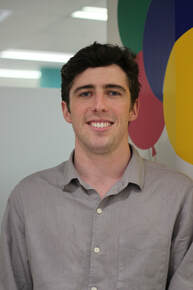
I completed a Bachelor of Science (Psychology) at the University of Sydney and a Graduate Diploma of Psychology (Advanced) at Monash University. I have always been interested in people, the human mind and what motivates people to do the things they do. I am particularly interested in working to improve the psychological wellbeing of young people, as I believe this is the most vulnerable period of life and it is important to be heard and guided through this difficult stage. I am also interested in mindfulness and how it can be used to help all people improve their relationship with their thoughts, feelings and physical experiences. I have worked several different jobs in recent years including as a Telephone Crisis Supporter at Lifeline and with Headspace delivering mental health and wellbeing programs for high school students.
What is your current role?
I am a Research Assistant in the Ethics & Genetics team of the Behavioural Sciences Unit. I am currently working on the PRecISion Medicine for Children with Cancer (PRISM) psychosocial sub-study. This study is investigating patients’, parents’ and healthcare professionals’ views and experiences of taking part in a personalised cancer medicine study for children with a high-risk cancer where the chance of cure with standard treatment is low. The study aims to understand the psychological implications of taking part in a precision medicine trial.
I am also working on SibStars, a study investigating the quality of life, family relationships and information needs in siblings of children with a chronic illness. Siblings of children with a chronic illness are often overlooked, however, their psychological wellbeing can be negatively impacted by changes in family dynamics and increased caretaking responsibilities. This research aims to develop a better understanding of their experiences and needs, and hopefully lead to a bolstering of protective factors and more positive outcomes for all siblings of children with chronic illnesses.
What are the ‘best’ parts of your current role?
One of the best parts of my current role is getting to work within a multidisciplinary team. It’s exciting to work with people from many different backgrounds and professions, as they all have different perspectives, experiences and knowledge to draw on.
I also enjoy coming to work everyday and having different tasks to work on. No two days are the same and there is always a new challenge to be tackled. I am motivated by the fact that there are always new skills I can learn and ways I can improve myself and the work I produce.
Lastly, it is extremely rewarding to be involved in research that aims to improve the lives of those dealing with the devastating effects of cancer. It is certainly motivating, yet humbling, to be contributing to such a great cause and hopefully making life easier for the patients and families affected by cancer.
What are the most challenging parts of your role?
It is often challenging to be confronted with the harsh reality of the patients and their families dealing with cancer. It is difficult to accept that much of the research we do is designed to find better treatments for future cancer patients and may not be of any benefit to current patients who are giving their valuable time and energy to contribute to our studies.
Where do you see yourself in five years’ time?
In five years’ time, I would like to be working as a psychologist or completing a PhD in one of my interest areas in psychology. I am passionate about both clinical and research psychology, so would be happy working in either domain to improve the wellbeing of individuals and the wider community.
What advice would you have for someone wanting to follow a similar path in terms of their study/career?
My first piece of advice would be study hard and achieve the best you can academically, as this will put you in the best position to take any path you want.
Secondly, try and gain as much experience as you can in your field. Volunteering is invaluable for getting a taste of what it’s like to work in your field and developing practical skills that aren’t offered much in school or university. Also, it’s a great way to develop your interpersonal skills and make contacts that can provide other opportunities for you in the future. Even if these experiences aren’t exactly the type of work you’d like to be doing, most professional skills are transferrable, and these experiences may spark new interests and opportunities you didn’t expect.
Lastly, I would advise that if you’re not sure what to do, then just do something. The best way to work out what your interests and passions are is by trying different things, whatever they may be, until you find where you belong. And while that may take a long time, the skills, relationships and experiences you accumulate along the way will be more than worth it.
 RSS Feed
RSS Feed